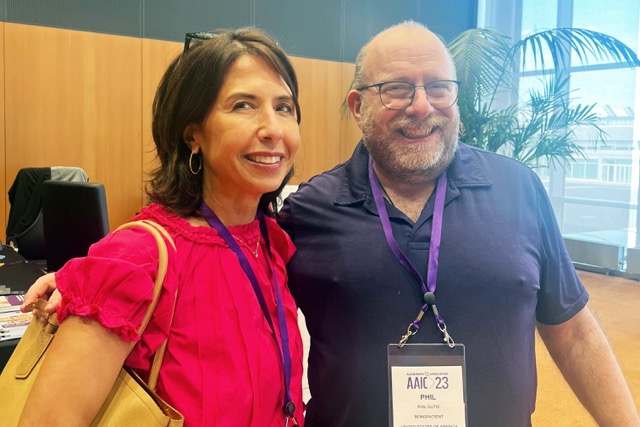In his day-three dispatch from AAIC in Amsterdam, writer Phil Gutis, UsAgainstAlzheimers's Meryl Comer, the Alzheimer's Association's Maria Carrillo and others surveil the bumpy but beautiful road ahead. (The NIA's director, however, sat this one out.)
AMSTERDAM —In the data presented at this week’s Alzheimer’s Association International Conference in Amsterdam, donanemab has been shown to slow development of memory and thinking problems to extents should cause every single person in the country concerned about their cognitive abilities to run to their doctors for an evaluation and potential treatment with Eli Lilly’s anti-amyloid Alzheimer’s drug, which is expected to win approval by the FDA later this year or early next year.
What happens when they arrive at their doctor’s office, however, is a real and growing concern.
Virtually every person I’ve talked with and discussion I’ve listened to raises the alarm bell about health care systems in the United States and worldwide that are not prepared for handling the rush of scientific advances that have started to drop like pennies from heaven.
Before arriving at the AAIC conference, I frankly felt pretty pessimistic. I was delighted about the medical advances but very worried about the ability of medical systems, from primary care doctors to neurologists to hospital systems and the government, to respond.
I heard about the likelihood of five-year waits for neurologist appointments in some markets and the lack of radiologists trained to read PET scans.
The energy of the 7,000-plus participants at the conference makes it impossible to stay overly worried.
Yes, we’re going to have a bumpy ramp up as our medical systems build capacity. Yes, we’re going to have to deal with naysayers unconvinced that current treatments are worthy of the time and money and slight risks.
On Sunday, I happened to meet the press person for the National Institute for Aging who handed me a “tip sheet” about NIA experts available at the conference for comment.
One of those was Richard Hodes, the NIA director. So I figured why not and asked for an interview with Dr. Hodes, thinking there would be no better person to calm my concerns about the nation’s health care system. After a bit of back and forth via email, I was told that no NIA official would address my concerns.
“While NIA experts could speak to NIH-conducted and -funded progress in Alzheimer’s disease and related dementia research, they would not address questions about the healthcare system and broader federal government roles,” the press person replied.
“Frankly,” I wrote back, “it seems to be a bit weird that the National Institutes of Health is unwilling to talk about the state of our national health system and its unpreparedness for dealing with Alzheimer’s treatment.”
While it was disappointing not to be able to get to talk with a high-ranking government official, each and every other person I’ve encountered at this conference, from the academics, business leaders, advocates and others, has been a source of hope.
There is such a strong sense of optimism here that the forward progress is — finally — unstoppable, and that health systems will be forced to adapt.

Compared to a year ago, when the field was engulfed in controversy regarding the first-ever disease modifying drug, today there is a pervasive feeling or belief that within a relatively short period cognitive decline will become a chronic condition managed just like my doctors deal with my stubborn type 2 diabetes, and cholesterol, and blood pressure.
Imagine, if you can, a simple blood test that your doctor can order if you have warning signs.
Imagine, if you can, AI systems that comb through hundreds of thousands of patient records looking for those earliest signs.
Then imagine that there are actually treatments available that can slow the inevitable decline.
That we don’t need to actually imagine: donanemab is the latest drug that is awaiting FDA approval and all signs are good that it will receive the government’s OK by the end of the year.
“I finally feel that we are entering the era of treatment,” said Mike Zuendel, an investment adviser living in Iowa who was diagnosed with early onset Alzheimer’s several years ago,
Meryl Comer, a leading light in the Alzheimer’s community, agreed that we’re entering an era of mind-blowing advances.
“While we all celebrate a first for our field,” she said, “I keep focusing on what’s next: Lilly’s drug donanemab, FDA approval of blood-based diagnostics by the end of 2024, pills by 2025 and vaccine by 2030.”
Her concern is how the community can “persuade doctors to support our choices. Also, can we persuade healthy adults at high risk to step forward for early diagnosis and treatment.”
“There’s so much to be done to educate people about what’s at stake if they don’t grab at the first golden ring that offers to slow disease progression,” Comer said.
It is, as Dr. Maria Carrillo, the Association’s chief science officer, told the gathered crowd at the opening plenary: “When my own children, who are at high risk for Alzheimer’s disease because of our family history, ask me about their future, I know we will have answers for them because of your work.”
Mentioning the 5,600 study abstracts that she and her staff had reviewed before the AAIC conference, Carrillo thanked the researchers “on behalf of not only my family but all of those that we serve at the Alzheimer’s Association.”
“You are the reason why we will achieve our vision of a world without Alzheimer’s and all other dementia.”
That’s been the tag line for the Alzheimer’s Association for a while. Today, that dream actually feels achievable.
Phil Gutis is a former New York Times reporter and current Being Patient contributor who was diagnosed with early onset Alzheimer’s. This article is part of his Phil’s Journal series, chronicling his experience living with Alzheimer’s and his participation in the aducanumab clinical trial.